Oct. 18th 2019.
Last Sunday October 20th Protect Our Blanco held an open membership meeting at Gem of the Hills with local and regional experts to share information with local residents about the water quality threats to the Blanco River from wastewater discharge. Below we share with you some of the research and information that was shared at that meeting. You can see the entire slideshow presentation below and you can also download a PDF:
The current objective of Protect Our Blanco is to stop the City of Blanco from discharging treated effluent into the River and to partner with the City in promoting a healthy and productive ecosystem in the Blanco River. The
POB strives to protect the River through land application and beneficial reuse of treated wastewater effluent.
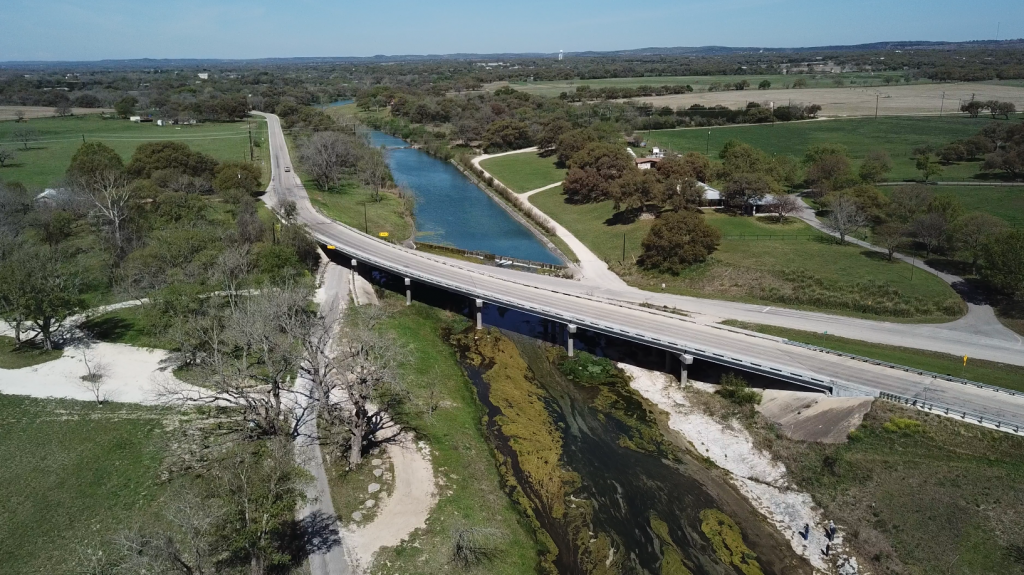
The city of Blanco is currently discharging an average of more than 100,000 gallons of treated effluent a day into the Blanco River. The picture from March shows the difference in water quality from upstream and downstream of the discharge point.
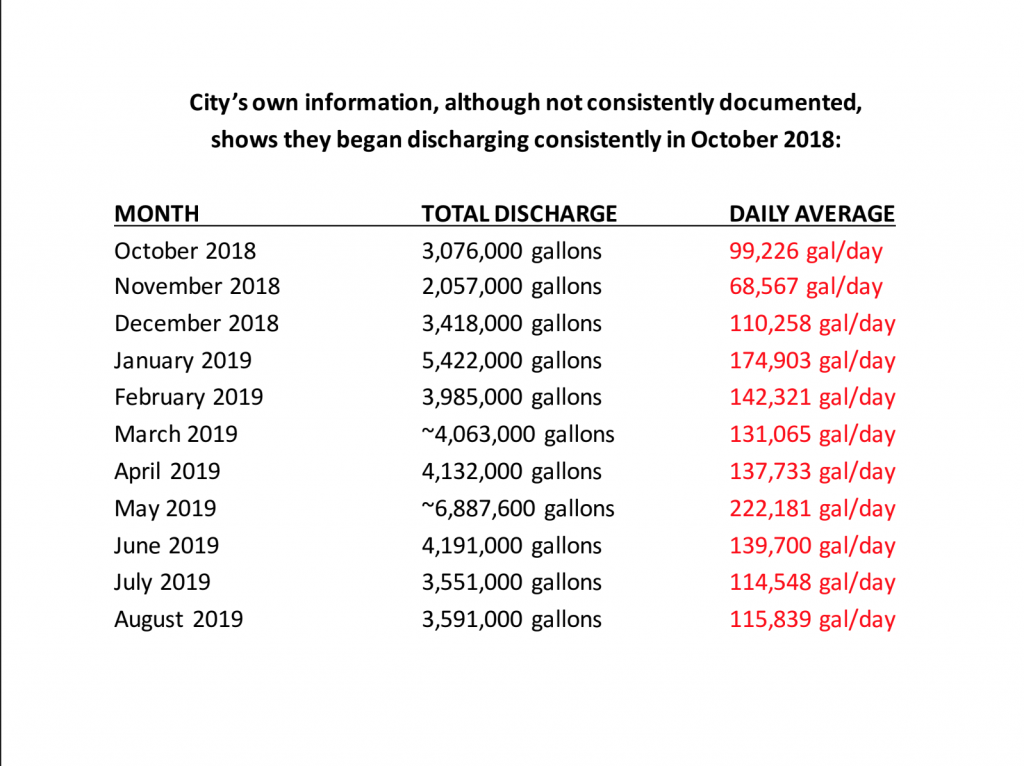
What makes matters worse is that in 2017 the City of Blanco applied for a permit to increase their discharge to 1.6 million gallons a day. If their current discharge rates are causing such a disturbance to the river, then the damages possible with this sevenfold increase would be significant.
The Blanco River is mostly rock and has very little topsoil and plant life. This means that any pollutants and added nutrients are much harder to dilute. TCEQ’s proposed and permitted effluent limits are not protective enough of our Hill Country Streams and Rivers, meaning the effluent is harmful even when treated to the permit standards. Not addressed by TCEQ permits are dangerous toxins such as Endocrine Disruptors, Pharmaceuticals minor elements, pesticides, and herbicides.

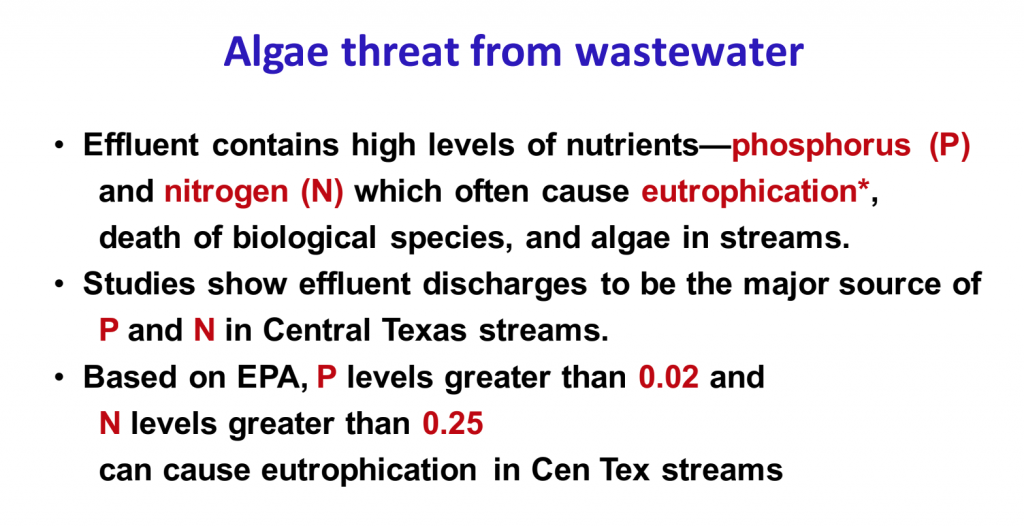
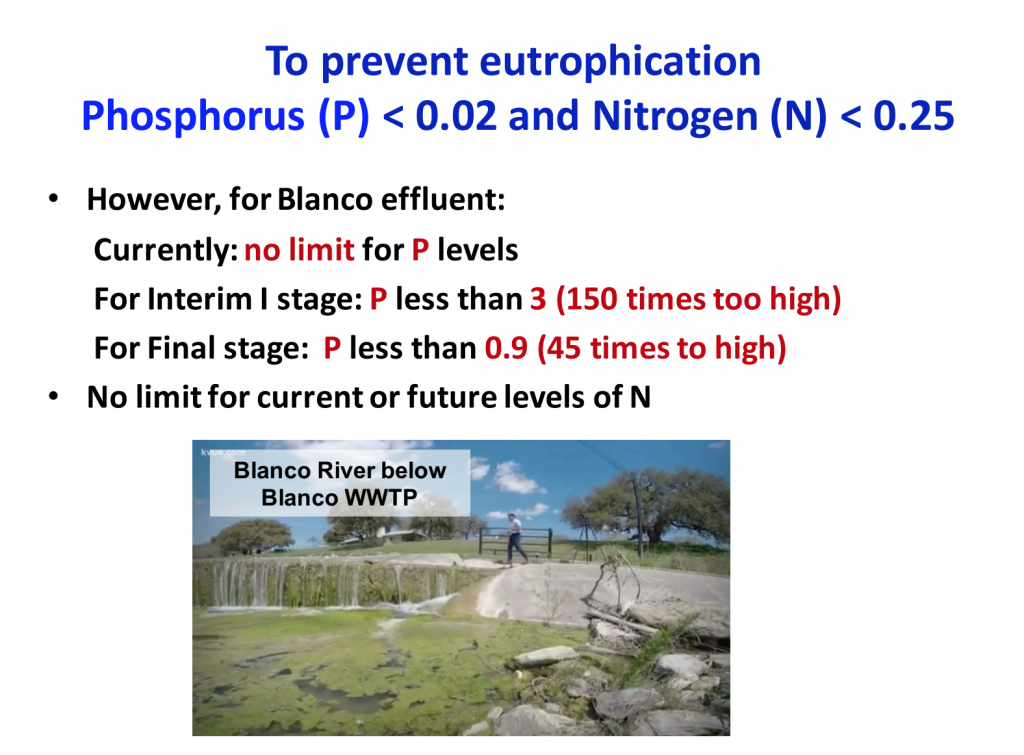
In addition to the threats mentioned above, POB is concerned about the City of Blanco’s compliance record.
Monthly compliance status available from Apr 2016 – Jun 2019
• During that 39 month period the following are reported:
• 18 months—significant non compliance—no data reports from plant including every month in 2018
• 2 months—only known compliance
• 9 months—unknown compliance status (reason not identified)
• 6 months—other violations (mostly no reports)
• 6 months—water-quality violation
• 1 month—outfall discharge violation Jan 2019 report–188 mgd flowed through the plant (reporting error?)
• Last reported sample: Apr. 30, 2019, E. COLI. Bacteria was 687 col/100 mL—4.5 times greater than EPA recommended limit for recreational water
• Despite these infractions, the Plant has not had an informal or formal enforcement action during the last at least 5 years
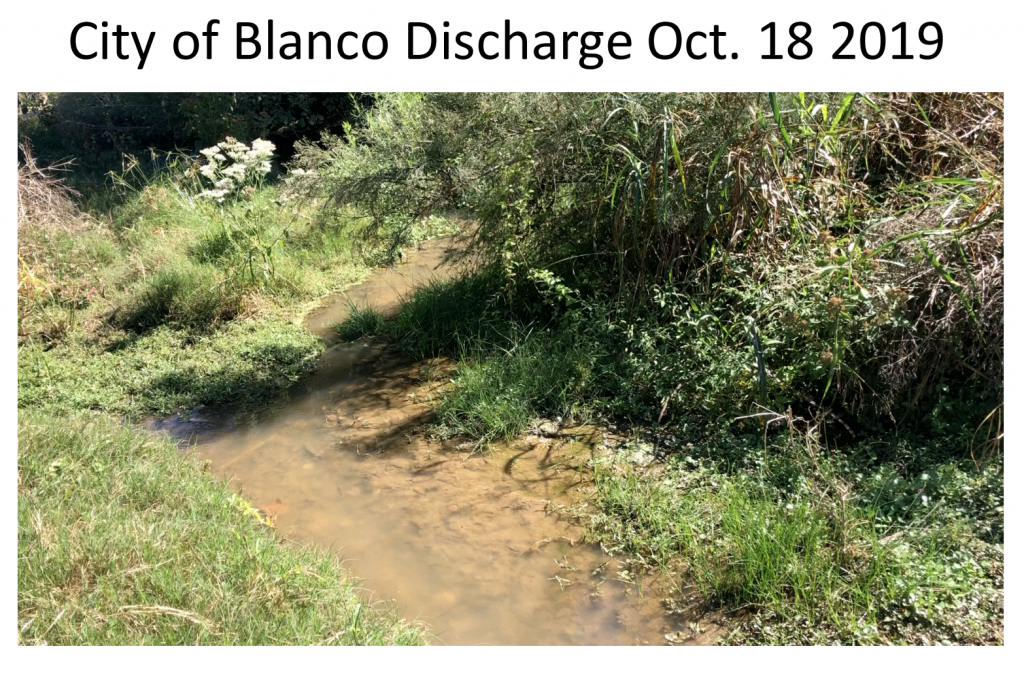
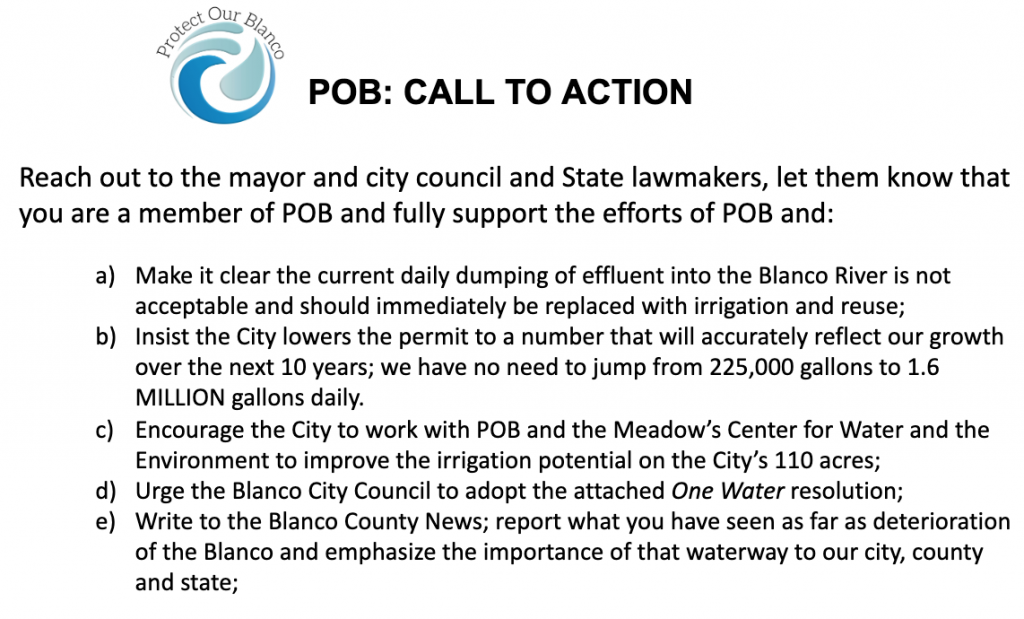
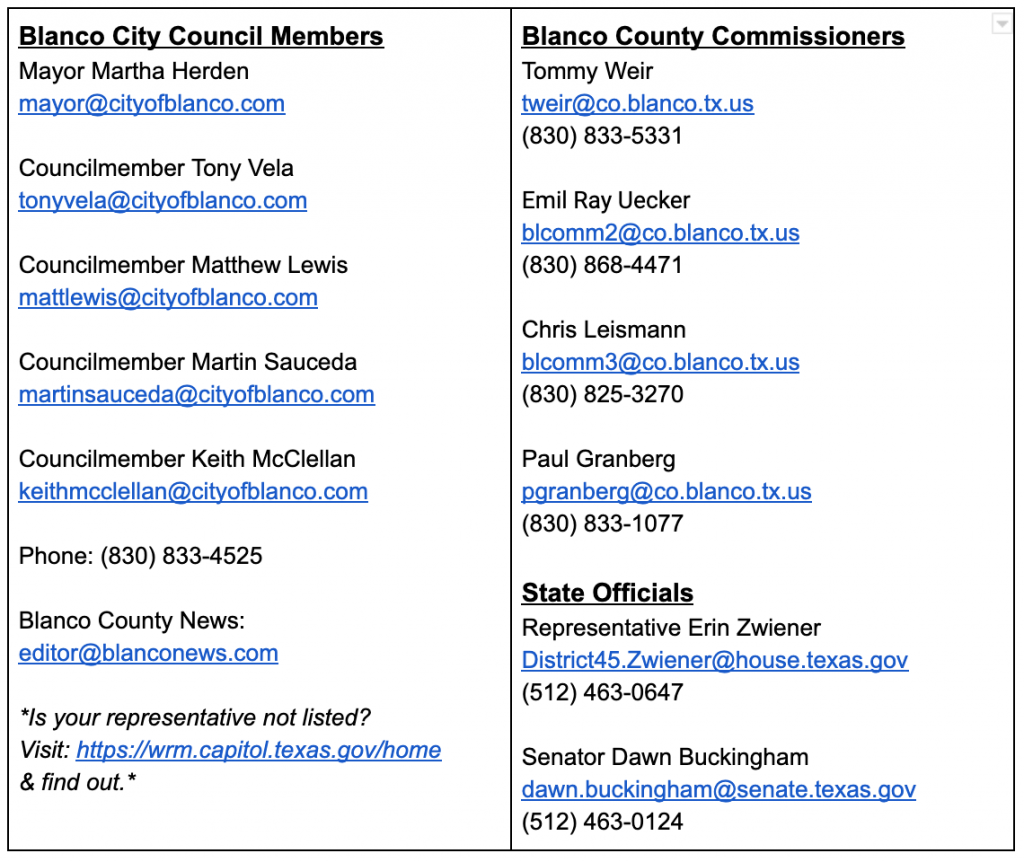
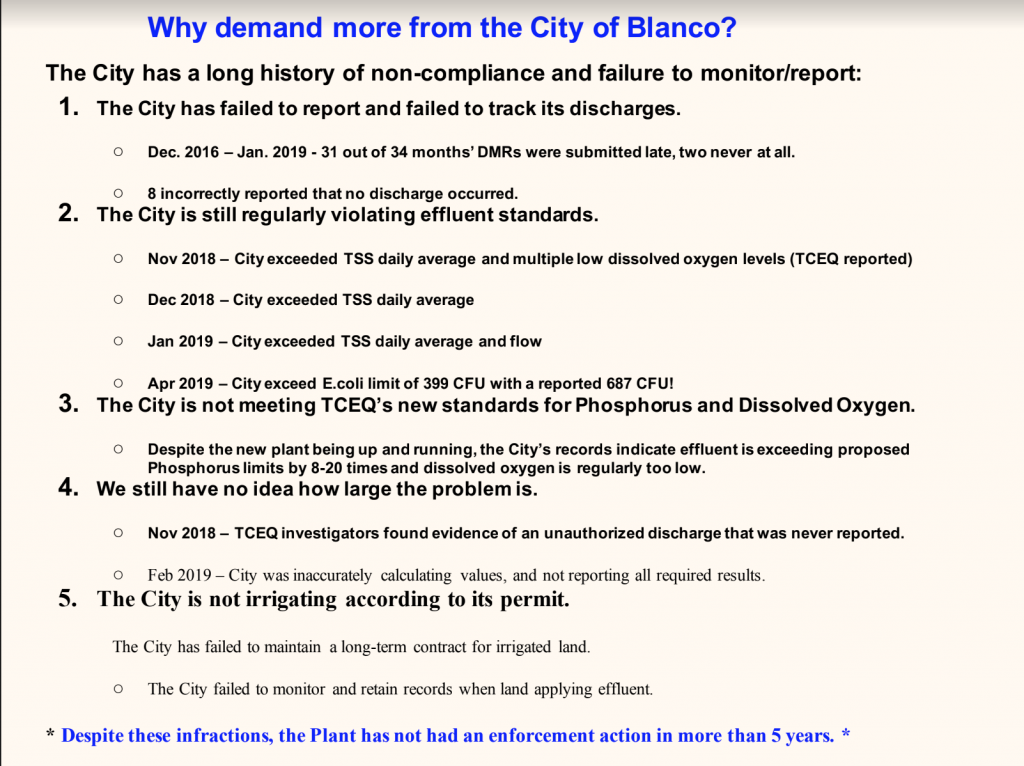
“WVWA and POB want the City to amend the draft permit request so that instead of 1.6 millions gallons per day, the overall permitted capacity of the plan remains at current levels and the effluent is irrigated or reused on available land adjacent to the treatment plant.”
A comprehensive One Water Land and Water Use Plan should be developed to serve as a model for the Texas Hill Country.
BLANCO ONE WATER RESOLUTION
WHEREAS, the Blanco River is an invaluable resource in the Texas Hill Country, providing clean recharge water for the Edwards and Trinity Aquifers, which are the primary sources of drinking water for millions of residents of Central and South Central Texas; and
WHEREAS, the Blanco River supports tourism for the City of Blanco and its business owners, whose economies depend on the continued aesthetic and recreational value of the river; and
WHEREAS, the Blanco River is a beloved treasure for Blanco residents and guests, who use the clean water for swimming, boating, fishing, birdwatching, and other aesthetic and recreational pursuits; and
WHEREAS, the City of Blanco is committed to addressing potential growth in an orderly and responsible fashion and to operating its business in an environmentally sensitive manner, including in regard to activities such as protecting our night skies and encouraging the rerouting of potential oil and gas pipelines; and
WHEREAS, the Texas Commission on Environmental Quality (“TCEQ”) mission statement says that the TCEQ strives to protect our state’s public health and natural resources consistent with sustainable economic development and the City of Blanco has similar goals; and
WHEREAS, in the past, the City of Blanco has preferred to use its wastewater for irrigation and reuse also called “land application,” instead of directly discharging it into the Blanco River; and
WHEREAS, the City of Blanco has applied to the TCEQ for a major amendment to its TPDES direct-discharge permit in order to directly discharge up to 1.6 million gallons per day of treated domestic wastewater into the Blanco River without any obligation to irrigate any portion of the wastewater and is currently not utilizing any effluent for irrigation; and
WHEREAS, the City of Blanco, pursuant to the terms of its TPDES permit, recently invested significant public resources in the construction of a new wastewater treatment facility capable of treating the City’s wastewater effluent to cleaner standards in regard to some of the contaminants of the wastewater effluent; and
WHEREAS, the City of Blanco remains committed to a “no-discharge” solution for disposing of its wastewater.
NOW, THEREFORE,
BE IT RESOLVED BY THE CITY COUNCIL OF THE CITY OF BLANCO:
- The City of Blanco is reaffirming its commitment to developing a no-discharge alternative in order to help prevent discharge of wastewater effluent into the Blanco River, in favor of using treated effluent for beneficial reuse, subsurface irrigation, land application and other alternative uses for the conservation and efficient management of it’s water resources; and
- The City of Blanco is affirming its commitment to developing a no-discharge alternative with the involvement, support, and assistance of the Meadows Center for Water and the Environment, engineers, planning professionals and regional stakeholders in order to achieve the shared goal of integrating a “One Water” approach to manage current and future development of land and water resources sustainably while ensuring the stewardship and health of the Trinity Aquifer and the Blanco River.
BE IT FURTHER RESOLVED:
- The City Council directs the Mayor to request TCEQ to “pause” the ongoing permitting process, so that the City can investigate and negotiate a no-discharge alternative plan with concerned residents, environmental groups, and other necessary stakeholders, which Council anticipates would require an amendment to the City’s pending permit application; and
- The City Council directs the Mayor to hold, with the assistance of the Meadows Center for Water and the Environment, consultants and stakeholders, a community-led public planning workshop series on the topic of alternative no-discharge designs for the City’s wastewater disposal operations; and
- The City Council directs the Mayor to, before the ____ day of October, 2019, establish and appoint a committee of stakeholders interested in finding solutions and alternatives to the City of Blanco’s disposition to reuse and irrigate wastewater effluent and avoid discharge of wastewater effluent into the Blanco River, to be known as the “Blanco Clean River Committee”; and
- The City Council directs the Mayor to schedule a site visit so that City-approved representatives of the respective stakeholder groups can visit the 110-acres of City-owned property and the operating wastewater treatment facility in order to investigate and develop a no-discharge, subsurface drip dispersal or other suitable and protective reuse alternative; and
- The City Council directs the Mayor to schedule dates for negotiations with stakeholders and to approve a mediator or facilitator, identified by stakeholders, that will facilitate negotiations.